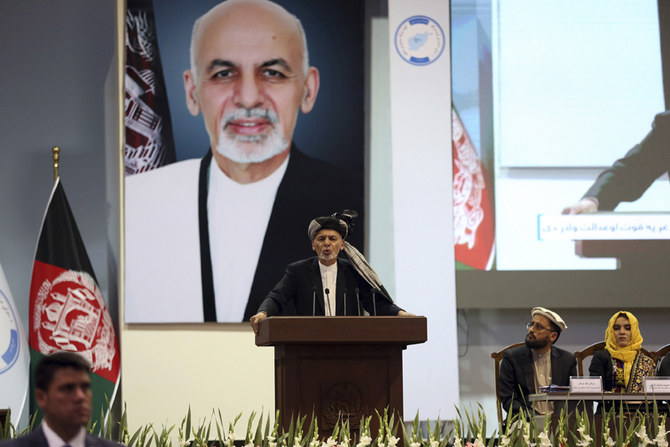KABUL: US President Donald Trump has insisted that peace talks with the Taliban can only resume if a cease-fire is enforced, according to Afghan leader Ashraf Ghani.
“Donald Trump emphasized the enforcement of a cease-fire as a precondition for the start of negotiations and said the inclusion of the Afghan government in peace talks is imperative,” a statement by the presidential palace said.
The two leaders spoke over the phone for 25 minutes on Thursday night during Ghani’s trip to the UAE. Trump also invited the Afghan president on an official visit to Washington, the statement added.
Ghani has long demanded that the US push for a truce before negotiations resume. The Afghan leader has been left out of nine rounds of secret talks in Qatar between Taliban representatives and Trump’s peace envoy to Afghanistan, Zalmay Khalilzad.
Secrecy surrounding the talks has angered Ghani and soured ties between Kabul and Washington.
Former military leaders who served in Afghanistan have repeatedly warned Trump that failure to involve the Afghan administration in negotiations will boost the morale of the Taliban, which has frequently refused to hold direct talks with Kabul.
In September, Trump abruptly called off peace talks amid widening Taliban attacks, but Khalilzad last month resumed informal discussions with the militants that led to an exchange of prisoners several days ago.
The Afghan government freed three senior extremists linked to the Taliban. In return a US and an Australian professor from the American University in Afghanistan were released after more than three years in captivity. The prisoner swap was hailed by both sides amid hopes that it could help restart talks.
HIGHLIGHTS
• Peace talks stalled in September amid increasing Taliban attacks.
• The Taliban have repeatedly refused to negotiate directly with the Afghan government.
Ghani’s chief spokesman, Sediq Sediqqi, said the US and Afghan leaders “had a detailed discussion about the peace process and the important progress Afghan security forces have made on the battlefield.”
“President Trump also emphasized that for any process to succeed, the Afghan government’s inclusion in the talks and their ownership of the process is imperative,” he added.
The Taliban have not commented on the claim, but in the past the group has opposed any truce before a timetable is established for the pullout of foreign troops.
After the prisoner exchange, the Taliban again declined to hold direct talks with Kabul, adding that government officials can take part in a personal capacity like other participants, including Afghan politicians.
Some analysts said that Trump’s push for the enforcement of a truce is a major boost for Ghani.
“This is a big achievement for the government because Trump has declared his support for Ghani’s long-standing demand,” Jamaluddin Badr told Arab News. “It seems that the US has realized that the cause of the government is justifiable.”
Akbar Polad, another analyst, said the convergence of regional players such as Iran, Pakistan, China and Russia on the issue, as well as the recent wave of protests in Iran and Iraq, prompted Washington to favor the Afghan government as an ally in the region.
“The Americans know that without coordination with Afghan government, they will not succeed. The Afghan government also badly needs the US,” he said.
















